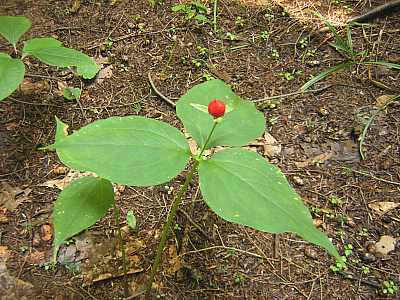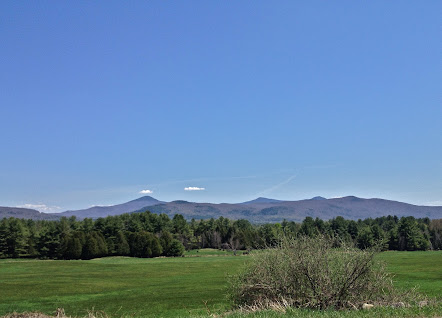I land at Lee's Cliff, in Fair Haven Pond, and sit on the Cliff. Late in the afternoon. The wind is gone down; the water is smooth; a serene evening is approaching; the clouds are dispersing.
The
pond, so smooth and full of reflections after a dark and breezy day, is unexpectedly
beautiful. There is a little boat on it, schooner-rigged, with three sails, a
perfect little vessel and perfectly reflected now in the water. There is hardly
a puff of air, and the boatman is airing his sails after the storm. Being in
the reflection of the opposite woods, the water on which the little boat rests
is absolutely invisible, and it makes an impression of buoyancy and lightness.
I
float slowly down from Fair Haven till I have passed the bridge. The sun, half
an hour high, has come out again just before setting, with a brilliant, warm
light, and there is the slightest undulation discernible on the water, from the
boat or other cause, as it were its imitation in glass. The reflections are
perfect. A bright, fresh green on fields and trees now after the rain, spring-like
with the sense of summer past. The reflections are the more perfect for the
blackness of the water.
This
is the most glorious part of this day, the serenest, warmest, brightest part,
and the most suggestive. Evening is fairer than morning. Morning is full of promise and vigor. Evening
is pensive. The serenity is far more remarkable to those who are on the water.
That
part of the sky just above the horizon seen reflected, apparently, some rods
off from the boat is as light a blue as the actual, but it goes on deepening as
your eye draws nearer to the boat, until, when you look directly down at the
reflection of the zenith, it is lost in the blackness of the water.
I observe, on the willows on the east shore, the shadow of my boat and self and oars, upside down.
The evening of the year is colored like the sunset.
I observe, on the willows on the east shore, the shadow of my boat and self and oars, upside down.
The evening of the year is colored like the sunset.
I land at Lee's Cliff, in Fair Haven Pond, and sit on the Cliff. Late in the afternoon . . . See February 14, 1851 ("One afternoon in the fall, November 21st, I saw Fair Haven Pond with its island and meadow; between the island and the shore, a strip of perfectly smooth water in the lee of the island; and two hawks sailing over it; and something more I saw which cannot easily be described . . ."); April 14, 1852 ("Fair Haven Pond -- the pond, the meadow beyond the button-bush and willow curve, the island, and the meadow between the island and mainland with its own defining lines -- are all parted off like the parts of a mirror. A fish hawk is calmly sailing over all . . . "); November 1, 1852 ("As I approached their edge, I saw the woods beneath, Fair Haven Pond, and the hills across the river, — which, owing to the mist, was as far as I could see, and seemed much further in consequence. I saw these between the converging boughs of two white pines a rod or two from me on the edge of the rock; and I thought that there was no frame to a landscape equal to this, — to see, between two near pine boughs, whose lichens are distinct, a distant forest and lake, the one frame, the other picture. ");
Upside down shadow: see also October 18, 1853("Returning late, we see a double shadow of ourselves and boat, one, the true, quite black, the other directly above it and very faint, on the willows and high bank."); August 16, 1854 ("At the steam mill sand-bank is the distinct shadow of our shadows, — first on the water, then the double one on the bank bottom to bottom, one being upside down, — three in all, — one on water, two on land or bushes."); November 2, 1854 ("Sailing past the bank above the railroad, just before a clear sundown, close to the shore on the east side I see a second fainter shadow of the boat, sail, myself, and paddle, etc., directly above and upon the first on the bank. What makes the second? At length I discovered that it was the reflected sun which cast a higher shadow like the true one. As I moved to the west side, the upper shadow rose, grew larger and less perceptible; and at last when I was so near the west shore that I could not see the reflected sun, it disappeared; but then there appeared one upside down in its place!") and Walden, The Pond in Winter ("Sometimes, also, when the ice was covered with shallow puddles, I saw a double shadow of myself, one standing on the head of the other, one on the ice, the other on the trees or hillside.”)
The evening of the year is colored like the sunset. See August, 19, 1853 (" The day is an epitome of the year.”); November 14, 1853 (“October [w]ith respect to its colors and its season, it is the sunset month of the year, when the earth is painted like the sunset sky.”)














